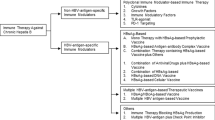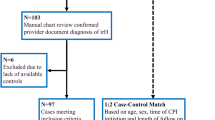Abstract
Purpose of Review
Hepatitis B virus (HBV) is a leading cause of hepatocellular carcinoma (HCC). Patients in the early phase of chronic HBV infection are designated “immune-tolerant” due to highly active viral replication without significant liver damage. Although these individuals are believed to have a low HCC risk, recent data showed conflicting results, which are summarized in this review.
Recent Findings
Clonally expanded hepatocytes with HBV integration have been detected in immune-tolerant patients, implying a theoretical HCC risk. Different cohort studies have shown conflicting HCC risk due to the heterogeneity of the patient population defined by fluctuating variables such as HBV DNA and alanine aminotransferase levels. As antiviral treatment response is poor, initiating prolonged therapy in immune-tolerant patients poses a challenge.
Summary
The absence of a clear definition for “genuine” immune-tolerant patients underscores the necessity for novel and stable biomarkers to guide when to start antiviral treatment.

Similar content being viewed by others
References
Papers of particular interest, published recently, have been highlighted as: • Of importance •• Of major importance
Nguyen MH, Wong G, Gane E, Kao JH, Dusheiko G. Hepatitis B virus: advances in prevention, diagnosis, and therapy. Clin Microbiol Rev 2020;33:e00046-19
Terrault NA, Lok ASF, McMahon BJ, Chang KM, Hwang JP, Jonas MM, et al. Update on prevention, diagnosis, and treatment of chronic hepatitis B: AASLD 2018 hepatitis B guidance. Hepatology. 2018;67:1560–99.
European Association for the Study of the Liver. Electronic address eee, European Association for the Study of the L. EASL. Clinical Practice Guidelines on the management of hepatitis B virus infection. J Hepatol. 2017;2017(67):370–98.
Sarin SK, Kumar M, Lau GK, Abbas Z, Chan HL, Chen CJ, et al. Asian-Pacific clinical practice guidelines on the management of hepatitis B: a 2015 update. Hepatol Int. 2016;10:1–98.
Chen CJ, Yang HI, Su J, Jen CL, You SL, Lu SN, et al. Risk of hepatocellular carcinoma across a biological gradient of serum hepatitis B virus DNA level. JAMA. 2006;295:65–73.
Lok AS, McMahon BJ, Brown RS Jr, Wong JB, Ahmed AT, Farah W, et al. Antiviral therapy for chronic hepatitis B viral infection in adults: a systematic review and meta-analysis. Hepatology. 2016;63:284–306.
Tseng TC, Liu CJ, Chen CL, Wang CC, Su TH, Kuo SF, et al. Serum hepatitis B virus-DNA levels correlate with long-term adverse outcomes in spontaneous hepatitis B e antigen seroconverters. J Infect Dis. 2012;205:54–63.
Liu CJ, Chen PJ, Lai MY, Kao JH, Chang CF, Wu HL, et al. A prospective study characterizing full-length hepatitis B virus genomes during acute exacerbation. Gastroenterology. 2003;124:80–90.
Tseng TC, Kao JH. Treating immune-tolerant hepatitis B. J Viral Hepat. 2015;22:77–84.
Hsu HY, Chang MH, Chen DS, Lee CY, Sung JL. Baseline seroepidemiology of hepatitis B virus infection in children in Taipei, 1984: a study just before mass hepatitis B vaccination program in Taiwan. J Med Virol. 1986;18:301–7.
Chen DS. From hepatitis to hepatoma: lessons from type B viral hepatitis. Science. 1993;262:369–70.
Liaw YF, Chu CM. Hepatitis B virus infection. Lancet. 2009;373:582–92.
Tseng TC, Liu CJ, Su TH, Wang CC, Chen CL, Chen PJ, et al. Serum hepatitis B surface antigen levels predict surface antigen loss in hepatitis B e antigen seroconverters. Gastroenterology. 2011;141(517–525):e2.
Chu CM, Liaw YF. Predictive factors for reactivation of hepatitis B following hepatitis B e antigen seroconversion in chronic hepatitis B. Gastroenterology. 2007;133:1458–65.
Chen YC, Chu CM, Liaw YF. Age-specific prognosis following spontaneous hepatitis B e antigen seroconversion in chronic hepatitis B. Hepatology. 2010;51:435–44.
Hui CK, Leung N, Yuen ST, Zhang HY, Leung KW, Lu L, et al. Natural history and disease progression in Chinese chronic hepatitis B patients in immune-tolerant phase. Hepatology. 2007;46:395–401.
Andreani T, Serfaty L, Mohand D, Dernaika S, Wendum D, Chazouilleres O, et al. Chronic hepatitis B virus carriers in the immunotolerant phase of infection: histologic findings and outcome. Clin Gastroenterol Hepatol. 2007;5:636–41.
Kennedy PT, Sandalova E, Jo J, Gill U, Ushiro-Lumb I, Tan AT, et al. Preserved T-cell function in children and young adults with immune-tolerant chronic hepatitis B. Gastroenterology. 2012;143:637–45.
Mason WS, Gill US, Litwin S, Zhou Y, Peri S, Pop O, et al. HBV DNA integration and clonal hepatocyte expansion in chronic hepatitis B patients considered immune tolerant. Gastroenterology. 2016;151(986–998):e4.
Kim GA, Lim YS, Han S, Choi J, Shim JH, Kim KM, et al. High risk of hepatocellular carcinoma and death in patients with immune-tolerant-phase chronic hepatitis B. Gut. 2018;67:945–952
Lee HW, Kim SU, Baatarkhuu O, Park JY, Kim DY, Ahn SH, et al. Comparison between chronic hepatitis B patients with untreated immune-tolerant phase vs. those with virological response by antivirals. Sci Rep. 2019;9:2508.
Jeon MY, Kim BK, Lee JS, Lee HW, Park JY, Kim DY, et al. Negligible risks of hepatocellular carcinoma during biomarker-defined immune-tolerant phase for patients with chronic hepatitis B. Clin Mol Hepatol. 2021;27:295–304.
Lee HW, Chon YE, Kim BK, Yip TC, Tse YK, Wong GL, et al. Negligible HCC risk during stringently defined untreated immune-tolerant phase of chronic hepatitis B. Eur J Intern Med. 2021;84:68–73.
Lee HA, Lee HW, Kim IH, Park SY, Sinn DH, Yu JH, et al. Extremely low risk of hepatocellular carcinoma development in patients with chronic hepatitis B in immune-tolerant phase. Aliment Pharmacol Ther. 2020;52:196–204.
•• Lee HA, Kim SU, Seo YS, Ahn SH, Rim CH. Comparable outcomes between immune-tolerant and active phases in noncirrhotic chronic hepatitis B: a meta-analysis. Hepatol Commun. 2023;7:e0011. The meta-analysis suggests that the HCC risk in immune-tolerant patients is minimal and is comparable with immune-acitve phase with antiviral treatment
Chan HL, Chan CK, Hui AJ, Chan S, Poordad F, Chang TT, et al. Effects of tenofovir disoproxil fumarate in hepatitis B e antigen-positive patients with normal levels of alanine aminotransferase and high levels of hepatitis B virus DNA. Gastroenterology. 2014;146:1240–8.
Wong VW, Hui AJ, Wong GL, Chan RS, Chim AM, Lo AO, et al. Four-year outcomes after cessation of tenofovir in immune-tolerant chronic hepatitis B patients. J Clin Gastroenterol. 2018;52:347–52.
Feld JJ, Terrault NA, Lin HS, Belle SH, Chung RT, Tsai N, et al. Entecavir and peginterferon alfa-2a in adults with hepatitis B e antigen-positive immune-tolerant chronic hepatitis B virus infection. Hepatology. 2019;69:2338–48.
Rosenthal P, Ling SC, Belle SH, Murray KF, Rodriguez-Baez N, Schwarzenberg SJ, et al. Combination of entecavir/peginterferon alfa-2a in children with hepatitis B e antigen-positive immune tolerant chronic hepatitis B virus infection. Hepatology. 2019;69:2326–37.
Lee HW, Chan HL. Unresolved issues of immune tolerance in chronic hepatitis B. J Gastroenterol. 2020;55:383–9.
Tseng TC, Huang LR. Immunopathogenesis of hepatitis B virus. J Infect Dis. 2017;216:S765–70.
Lumley SF, McNaughton AL, Klenerman P, Lythgoe KA, Matthews PC. Hepatitis B virus adaptation to the CD8+ T cell response: consequences for host and pathogen. Front Immunol. 2018;9:1561.
Liu CJ, Chen TC, Chen PJ, Wang HY, Tseng TC, Cheng HR, et al. Micro-evolution of the hepatitis B virus genome in hepatitis B e-antigen-positive carriers: comparison of genotypes B and C at various immune stages. J Gastroenterol Hepatol. 2015;30:172–7.
Wang HY, Chien MH, Huang HP, Chang HC, Wu CC, Chen PJ, et al. Distinct hepatitis B virus dynamics in the immunotolerant and early immunoclearance phases. J Virol. 2010;84:3454–63.
Wang M, Chen L, Dong M, Li J, Zhu B, Yang Z, et al. Viral quasispecies quantitative analysis: a novel approach for appraising the immune tolerant phase of chronic hepatitis B virus infection. Emerg Microbes Infect. 2021;10:842–51.
Tseng TC, Liu CJ, Hsu CY, Hong CM, Su TH, Yang WT, et al. High level of hepatitis B core-related antigen associated with increased risk of hepatocellular carcinoma in patients with chronic HBV infection of intermediate viral load. Gastroenterology. 2019;157(1518–1529):e3.
Tseng TC, Liu CJ, Yang HC, Su TH, Wang CC, Chen CL, et al. High levels of hepatitis B surface antigen increase risk of hepatocellular carcinoma in patients with low HBV load. Gastroenterology. 2012;142:1140–9.
• Yeh SH, Li CL, Lin YY, Ho MC, Wang YC, Tseng ST, et al. Hepatitis B virus DNA integration drives carcinogenesis and provides a new biomarker for HBV-related HCC. Cell Mol Gastroenterol Hepatol. 2023;15:921–9. This review summarizes the carcinogenesis attributed to random integration of HBV genome
Kim GA, Han S, Choi GH, Choi J, Lim YS. Moderate levels of serum hepatitis B virus DNA are associated with the highest risk of hepatocellular carcinoma in chronic hepatitis B patients. Aliment Pharmacol Ther. 2020;51:1169–79.
Chen CF, Lee WC, Yang HI, Chang HC, Jen CL, Iloeje UH, et al. Changes in serum levels of HBV DNA and alanine aminotransferase determine risk for hepatocellular carcinoma. Gastroenterology. 2011;141:1240–8 1248 e1-2.
Yuen MF, Lim SG, Plesniak R, Tsuji K, Janssen HLA, Pojoga C, et al. Efficacy and safety of bepirovirsen in chronic hepatitis B infection. N Engl J Med. 2022;387:1957–68.
Wooddell CI, Yuen MF, Chan HL, Gish RG, Locarnini SA, Chavez D, et al. RNAi-based treatment of chronically infected patients and chimpanzees reveals that integrated hepatitis B virus DNA is a source of HBsAg. Sci Transl Med 2017;9.
Funding
The work was supported by the grants from National Taiwan University Hospital (107-N4041 and 108-N4157), the Ministry of Science and Technology, Executive Yuan, Taiwan (MOST 106–2314-B-002 -136), and Gilead Sciences (IN-TW-988–5987).
Author information
Authors and Affiliations
Corresponding author
Ethics declarations
Conflict of Interest
T-C. T. has served on speaker’s bureaus and received grant support from Gilead Sciences. H-Y. L. and J-H. K. declare no conflicts of interests.
Human and Animal Rights and Informed Consent
This article does not contain any studies with human or animal subjects performed by any of the authors.
Additional information
Publisher's Note
Springer Nature remains neutral with regard to jurisdictional claims in published maps and institutional affiliations.
Rights and permissions
Springer Nature or its licensor (e.g. a society or other partner) holds exclusive rights to this article under a publishing agreement with the author(s) or other rightsholder(s); author self-archiving of the accepted manuscript version of this article is solely governed by the terms of such publishing agreement and applicable law.
About this article
Cite this article
Tseng, TC., Lin, HY. & Kao, JH. Management of Immune-Tolerant Patients with Chronic HBV Infection. Curr Hepatology Rep 22, 130–137 (2023). https://doi.org/10.1007/s11901-023-00604-9
Accepted:
Published:
Issue Date:
DOI: https://doi.org/10.1007/s11901-023-00604-9




